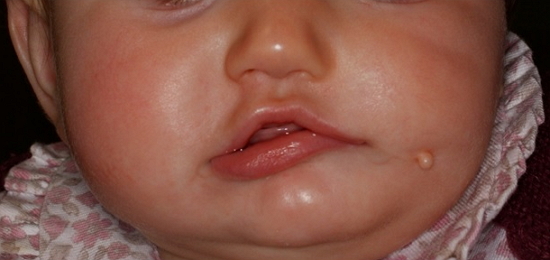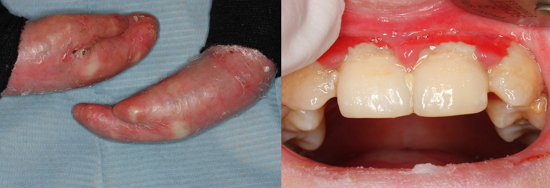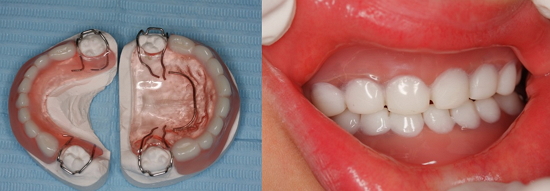INTEGRATED ODONTOLOGICAL CARE IN CHILDREN WITH SPECIAL NEEDS
|
Description |
Through the open clinics in the Faculty of Dentistry of the Complutense University of Madrid and attended by professionals specialized in dental care in children patients who require special care, the possibility of performing dental treatments that improve the quality of life of these children patients.

10 month old girl with 1st arch syndrome and its corresponding intraoral and extraoral sequelae.
|
How does it work |
The following actions are carried out through the theoretical and practical load carried out under the Title "Integrated Dental Care in the Child with Special Needs" of the UCM:
- Realization of oral health education documents and conferences for parents, educators and children with special needs. Within the so-called health schools in special education centers. With this, we intend to create the acquisition of the greatest number of competences in the autonomy of health of the individual with functional diversity.
- Complete clinical examination of the comprehensive oral health status of the child's age patient suffering from some type of functional diversity. At the same time a report is made in order to inform the parents and / or guardians of the oral health needs of each child.
- Realization of the clinical procedures needed to achieve better health and therefore a higher quality of life in the child patient.
All the actions are carried out, under the cover of agreements signed with the vicerrectorado of institutional relations and cooperation of the UCM. At present, we have agreements with the General University Hospital La Paz in Madrid, CEPRI Foundation, ALEPH Foundation, Syndrome Down Foundation in Madrid and Leo Kanner Foundation.
After a previous contact with the population to be analyzed through special education centers, hospitals or study groups, an analysis of the condition of each child is carried out. A previous survey sent to the parents provides information about current or previous illnesses, previous dental experiences, etc., with the purpose of producing a detailed and individualized form for each child.

Patient of 8 years of age suffering from Epidermolysis Bullosa, observed the sequelae at the hands level, as well as the patient's oral health status.
Health strategies aimed at preserving oral health in these children are subsequently established, considering that in cases where the disease is extensive, the possibilities for oral care may be very limited. For all of the above, prevention is especially relevant since the moment pregnancy is considered high risk, establishing programs of follow-up and care in conjunction with the pediatrician, parents and special educator.
|
Advantages |
The present actions are aimed at offering children with physical or psychic diversity the dental care, which in these cases is clearly in need of improvements in their oral health.
The need for specialization within the health context in the specific needs of each patient leads us to look for improvement plans that help raise the quality of life of these children from the moment of diagnosis of their clinical pathology and allows us to reach Of the child and their families, an oral health plan individualized to their specific needs, with the purpose of minimizing the pathology most frequently present in these children.
|
Where has it been developed |
The main points of work to achieve our objectives have been:
- The centers agreed through the vice-rectorate of institutional relations and cooperation.
- The dental clinic of the Faculty of Dentistry of the UCM.
We also collaborate with groups of study and follow-up of pediatric patients born in conditions of high biological risk, composed of intensive pediatricians, psychologists, ophthalmologists, otorhinolaryngologists, neurologists, maxillofacial surgeons and social workers, carrying out joint oral health programs included in funded research projects By the Ministry of Education and Culture, the Community of Madrid and the Health Research Fund.

A 3-year-old female patient suffering from ectodermal dysplasia, the lack of teeth practically as a whole has been replaced in this case by both upper and lower dentures.
|
And also |
Included in these services can be created areas of collaboration in the form of oral health monitoring and control in three areas:
Inclusive oral health programs carried out in two areas:
- Oral health programs at home, where the purpose is that the child becomes responsible for his or her own care. At first it would be supervised by the parents, contemplating in the future the achievement of the patient's own autonomy.
- Oral health programs in the special care center, where the educator supervises and executes the protocols established in each child as an educational measure to achieve autonomy in their own health.
Dental care programs in the child with functional diversity, with all aspects to be considered in each case depending on the pathology present in each child. Establishment of care, prevention and follow-up programs, devising and applying new systems to enable and facilitate the control of oral disease in this group of children.
|
Contact |
|
© Office for the Transfer of Research Results – UCM |
|
PDF Downloads |
|
Classification |
|
Responsible Researcher |
Paloma Planells del Pozo: pplanells@odon.ucm.es
Department: Stomatology IV
Faculty: Odontology


